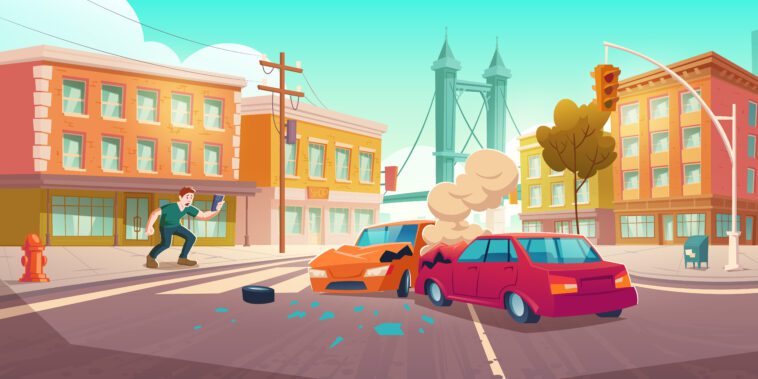Collision insurance is a type of insurance that covers the damages and costs incurred in an automobile accident. This can also include medical expenses and the cost of repairs to the other party’s car or property, as well as the costs incurred from natural disasters, weather damage, and theft. Depending on the coverage of your particular policy, you may also be protected against hit-and-run accidents.
Does collision insurance cover hit-and-run accidents?
Whether you are a driver or a passenger, a hit and run accident can leave you with some serious injuries. Thankfully, there are a few things you can do to protect yourself after an accident.
First, make sure you report the accident. This will ensure you get the information you need to file a claim with your insurance company. Some insurers may have an online form or mobile app to report the incident.
If you are involved in a hit and run, it is important to contact your insurance provider. You can also check with your local police department. The police can investigate the incident and help you file a claim.
Collision coverage can pay to repair or replace your vehicle if it is damaged. However, collision coverage doesn’t usually cover any medical expenses incurred from the incident. In addition, a deductible will likely apply.
A deductible is the portion of the cost of the claim you have to pay before your insurance plan begins to cover the rest. Your deductible will depend on the circumstances of your hit and run. Usually, you will have to pay the deductible out of pocket.
You can also choose to add uninsured or underinsured motorist coverage to your policy. This coverage can help you if you are in a hit and run and are unable to collect damages from the other party. While this isn’t required in every state, it can provide peace of mind.
Another type of insurance you can purchase is personal injury protection. This is mandatory in many states. It may cover any associated medical expenses and lost wages. Additionally, it may pay for child care.
Depending on the extent of the accident, you may be able to file a claim against the other driver’s liability insurance. Alternatively, you can file a claim with your own collision policy.
Leaving the scene of a hit and run can be illegal, so it is important to call the police. This is especially important if the other driver did not leave his or her vehicle.
Does collision insurance cover natural disasters, weather damage, and theft?
Many people may not realize that their car insurance policy includes coverage for weather-related damages. Some policies even offer coverage for theft. However, it’s a good idea to check with your insurance provider before buying any kind of cover.
One of the easiest ways to tell if your insurance covers natural disasters is by asking your agent. Some insurers will provide a list of policies with coverage for such events. In fact, it’s often necessary to get this kind of coverage if you live in an area that’s prone to such disasters.
The most comprehensive coverage can include such items as fire, hail, vandalism, and theft. This type of coverage is particularly useful if you own or have leased a high-value vehicle.
Depending on the nature of the damage, your insurance carrier might require you to fill out a form or make a cost estimate before settling any claim. There are also special requirements and restrictions you may be required to follow to make sure you receive your compensation.
A comprehensive insurance policy will also cover the costs of repairs if your vehicle was damaged in a collision. Often, a comprehensive coverage plan is required to obtain a loan or lease on a new vehicle.
When it comes to car insurance, the best way to save money is to get full coverage. Comprehensive and collision coverage are typically sold as a package by auto insurers. Having full coverage can help you maintain the value of your vehicle if you ever need to sell it.
Of course, if you’re still in the market for car insurance, don’t be afraid to shop around. You might be surprised at how much you can save with a reputable company.
Whether you’re looking for a new policy or you’re renewing your current one, it’s a good idea to know the insurance industry lingo. After all, you wouldn’t want to pay for repairs that weren’t covered by your insurance. Luckily, many providers provide a free online quote tool that makes it easy to compare rates.
Using this tool, you’ll be able to get the best possible coverage for the best possible price.
Does collision insurance pay to repair or replace my car after an accident?
A car accident can cause a lot of damage to your vehicle. Some accidents can be severe enough to warrant replacing the vehicle. Your insurer can help you with this process. The insurance company will provide the money needed to get your car back on the road.
When choosing collision insurance, you’ll need to consider a deductible. This amount is set at the time you buy the policy. You can choose from a variety of deductibles, usually ranging from $500 to $1,000. It’s up to you to decide whether or not a higher deductible is worth it.
In general, a higher deductible will decrease your monthly premium. On the other hand, a high deductible will also increase your out-of-pocket costs. So, if you’re looking for the cheapest possible auto coverage, it might not be a wise decision to pay more for your insurance deductible than you need.
While the deductible isn’t the most exciting part of purchasing collision insurance, it can still be a helpful tool. If you opt to file a claim, the deductible will help you cover some of the costs of repairs or replacement.
The deductible is a small amount of money that you pay when you file a claim. Most people carry a deductible of $500 or more. These amounts vary by company.
The deductible is usually a large number, but it’s not uncommon for a car insurance company to reduce the deductible by as much as $100 a year if you’ve not been in an accident.
Unlike comprehensive insurance, which pays for damages incurred from other vehicles, collision insurance only pays for damage to your car. And, while a deductible may be the best car insurance policy you can buy, if you’re not at-fault for the accident, it won’t be enough to cover the cost of your repair or replacement.
Collision insurance is a must for car loan buyers and leasers. But you can opt out of the coverage if you have an older vehicle. Before deciding on your options, you need to check the value of your vehicle.
Does collision insurance cover medical costs and damages for the person whose car or property you damaged?
Collision insurance protects you against the expense of repairs if your car is damaged in an accident. If the other driver is at fault for the accident, you will be reimbursed according to your policy’s limits. This means you will be able to begin the repair process quickly.
Bodily injury liability coverage covers injuries to other people in an accident. It can also cover legal fees if a person is sued. Some states require this type of coverage. The minimum amounts vary by state. For instance, in Texas, you must have at least $60,000 in coverage.
Medical payments coverage pays for medical expenses if you are involved in an accident. In some states, you must have this coverage if you ride in the other driver’s vehicle. However, in other states, this insurance is optional.
Property damage liability insurance is another type of liability coverage. It protects you against the cost of repairing or replacing the other driver’s vehicle. You may have to pay out of pocket if the other driver’s policy has low limits.
These policies are usually sold with a deductible. There are a few different deductible options: $200, $500 and $1,000. By paying the higher deductible, you can save on your premium.
When you get in an accident, take pictures of the scene. The police officer’s name and badge number will be helpful if you have to file a claim. Make sure you exchange insurance information with the other driver. Once you have it, you will be able to start the claim process with your own insurance company.
Collision and property damage coverage can be purchased separately or as part of a liability insurance package. Some insurers have combined limits that allow you to select which coverage is best for you. A collision policy can help you protect yourself from high repair costs, while a property damage policy can help you pay for damages to the other person’s car or other property.
Insurance companies have a set of deadlines for filing claims. If your company is taking too long to pay a claim, you should call and ask for assistance.




